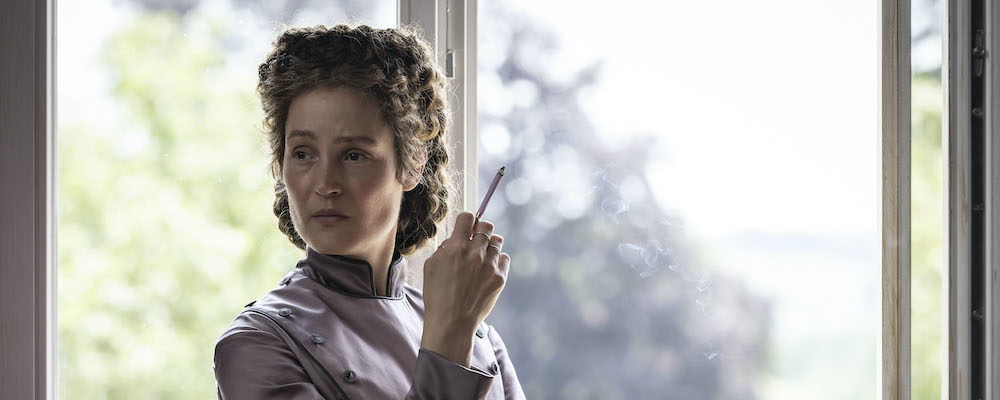‘Corsage’: Vicky Krieps Captivates as Empress Elisabeth of Austria
Sandra Miska
Vicky Krieps is both regal and relatable in “Corsage,” a biographical drama in which the German actor portrays 19th century consort Empress Elisabeth of Austria. Empress Elisabeth’s life has previously been chronicled in a trilogy of Austrian films in the 1950’s beginning with “Sissi,” a beloved romantic drama in the German-speaking world. But this latest film from writer-director Marie Kreutzer is far from a fairy tale, as it tells of Elisabeth’s life and trials after reaching her milestone 40th birthday.
40 in 1877 was not the same as it is today. As Elisabeth’s doctor points out during an examination, 40 was the average life expectancy for her female subjects. Although Elisabeth obviously has a better quality of life than the average woman of her time, one can surmise that shorter average lifespans were due mostly to deaths in childbirth, a very real threat to women of any class. We are reminded of this when Elisabeth is in bed with her husband, Emperor Franz Joseph (Florian Teichtmeister), and frets about the possibility of another pregnancy.
Krieps and Kreutzer do an excellent job of also showing how women react to aging is inherently the same in any era. While Elisabeth does not have the option of getting botox and fillers in her face, she does resort to having her corset laced as tight as possible and obsesses about her weight. It does not matter that Krieps’ Elisabeth is a timeless beauty and that women in any century would kill for her looks, she is still susceptible to societal pressures, pressures that are amplified by her being a very public figure and the fact that many only see the empress as a mere ornament in her husband’s court.
Despite her relative privilege, there is a sadness about Elisabeth. Like most women of her time, she has lost a child. After marrying Franz Joseph at age 16, she had her first child at 17, daughter Sophie. Tragically, Sophie died when she was two, and the grief of losing her remained with Elisabeth for the rest of her life. We see this early on when the empress looks on mournfully at a painting of Sophie and talks of the loss to her servants.
But Elisabeth is far from an old matron, as she is sporty and can exhibit a real zest for life when she feels like it. As a royal woman, Elisabeth has never been expected to deal with the day-to-day rearing of her children, but the two she has left are important parts of her life. Her eldest, Crown Prince Rudolph (Aaron Friesz), who is about 19/20, eventually carried out a murder-suicide pact with his mistress, but no signs of his eventual mental illness are shown here. Instead, we see a young man on the rise with something to prove, and he is not above admonishing his own mother for what he sees as improper, i.e. her close relationship with her English riding instructor (Colin Morgan).
Elisabeth also has an amusing relationship with her tween daughter, Valerie (Rosa Hajjaj). Like most kids her age, her mother is beyond embarrassing to her, mainly because the empress no longer cares that much about court etiquette, and the princess is increasingly aware of her own royal dignity. Later, after Elisabeth cuts her own hair in an act of rebellion, there’s a funny moment after she convinces her loyal lady-in-waiting Marie (Katharina Lorenz), to wear a veil and pretend to be her at a royal event. Valerie comments to her mother that she never looked more dignified.
Krieps is a revolution as Elisabeth, and Kreutzer was wise to give her film a voyeuristic feel rather than go the straightforward biopic route, as it helps us understand her subject better. The viewer feels close to the empress as she goes through a gamut of emotions. Other standout scenes include that of her quietly empathizing with a patient while visiting a mental hospital for women, her attempt to seduce her gay cousin, King Ludwig of Bavaria (Manuel Rubey), her being filmed by inventor Louis Le Prince (Finnegan Oldfield) with his motion-picture camera, and her having tea with her husband’s rumored mistress (Alice Prosser).
The viewer can easily draw parallels between Elisabeth’s life and that of modern female royals and other illustrious women who live their lives under a microscope. While the empress did not have the luxury of expressing herself and allowing her subjects to get to know her better through social media and Netflix documentaries, Krieps and Kreutzer do her justice here and present a woman who is very relatable to women in any age.
“Corsage” releases Dec. 23 in select theaters.

